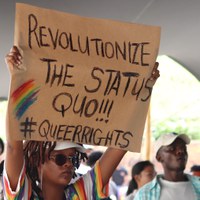
Queer Mental Health in South Africa: Breaking the Silence

These realities contribute to significantly higher rates of depression, anxiety, and suicidal ideation among LGBTIAQ++ people compared to the general population.
While mental health challenges affect everyone, queer and gender-diverse individuals face unique stressors. Daily experiences of exclusion, rejection, and microaggressions can create environments where self-acceptance and safety feel out of reach. Despite the existence of legal protections, access to affirming and inclusive mental health care remains limited especially outside urban centres. Too often, queer individuals encounter providers who lack adequate training in affirming care or who hold biases that deepen distress.
As the University of Pretoria’s Psychology Department recently highlighted, research continues to show that LGBTIAQ++ individuals are at a higher risk for mental health distress not because of anything inherent to their identities, but because of the heteronormative and heterocentric systems that shape our society. The struggle is not in being queer; it is in having to exist and thrive in spaces that often deny, silence, or invalidate queer identities.
Yet, hope and resilience remain central to the queer experience. Organisations such as the South African Depression and Anxiety Group (SADAG) and LifeLine provide vital crisis support, while initiatives like the Triangle Project offer specialised counselling and safe spaces for LGBTIAQ++ individuals. These resources remind us that community care and solidarity are essential tools for survival and healing.
This Mental Health Awareness Month, let’s centre queer voices, challenge stigma, and advocate for a mental health system that sees, hears, and affirms everyone because mental health is a human right.
We sat down with our Advocacy Officer and queer rights activist, Siyanga Magayana, to unpack what she’s witnessed on the ground and what still needs to be done to make healthcare more inclusive both in rural and urban settings.
From your work on the ground, what are some of the biggest mental health challenges facing queer people in South Africa today or your area?
One of the biggest challenges queer people is social isolation, being cut off from family, faith communities, or traditional support strictures of their queer identity. This isolation often leads to mental-health issues such depression, anxiety, and low self-esteem. Another compounding challenge is internalised homophobia and transphobia, especially in rural communities and societies where queerness and queer relationships are still seen as “un-African”. This rhetoric further marginalises, silences and exposes this community to violence, discrimination, and societal isolation. Again, many queer people also struggle with economic precarity, unemployment or job discrimination can make it difficult to access psycho-social support systems, of which directly impact mental health. In rural areas, for instance, the lack of mental health professionals who understand queer realities makes it even harder to access support.
How does stigma and discrimination within healthcare spaces affect queer people’s willingness to seek help?
Stigma in health facilities remains one of the biggest barriers in South Africa. Many queer individuals avoid health facilities i.e. clinics and hospitals because they have experienced ridicule, discrimination, judgement, or misgendering by health workers. Some are sometimes denied care outright, creating mistrust with the ‘system’. When your very identity is either phathologised or questioned, often by someone meant to help and support you, you start believing that you are safer suffering in silence than seeking help. That fear and trauma keep many queer individuals from accessing life-saving services i.e., HIV treatment or mental health support.
What changes are needed to make mental health and healthcare services more inclusive and affirming for the LGBTIAQ++ community?
We need real systemic change, not just tolerance. That means, training healthcare workers on sexual orientation, gender identity, and inclusive language. Secondly, we need to integrate queer-affirming mental health services into public health programs, especially in rural communities. In addition, hiring openly queer professionals and creating safe spaces within health-care facilities where people can seek support and speak freely without fear. Lastly, in a time where there is global regression on queer rights and protections, we must call for strengthening of policies that explicitly protect queer individuals from discrimination. Most importantly we need to move from “”treating” or “tolerating” queer people to affirming their existence, making healthcare a place of dignity, not judgement.
How can communities and allies better support queer people’s mental wellbeing?
Communities and allies can start by listening, really listening, without trying to correct, erase or diminish queer experiences and realities. Support can look like creating safe physical and emotional spaces and challenging homophobic and transphobic comments. Allies can also educate themselves rather relying on queer people to always do the teaching.
What message would you share with young queer people who are struggling with their mental health right now?
You are not alone, even if may feel like that sometimes. There is nothing wrong with who you are. The world may not always feel safe, but you still deserve to live, to experience love and joy as any another person. There are people who see you and want to see you thrive. Also, healing is not linear, and it is okay to take small steps. And your queerness is not a burden; you deserve to be so, hold onto hope and know that your existence is already an act of courage.
